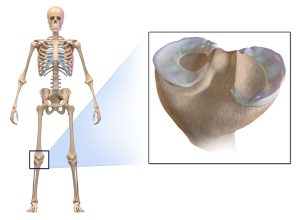Knee twisting injuries are common in athletes but it also occur in non-sports persons as well. Meniscal injuries are the most common ones among all. The meniscus is a crucial cushion for your knees. Imagine them as the shock absorbers in your car that keep the ride smooth. These C-shaped pieces of cartilage are nestled between the thigh bone (femur) and the shinbone (tibia), acting as a natural buffer, absorbing shock and distributing weight in your knee joint. This soft, rubbery tissue doesn’t get much attention until something goes wrong. By this article, we want to spread awareness in people about meniscal injury treatment in Noida by Dr Sumit Badhwar, the best orthopedic doctor in Noida
Table of Contents
ToggleWhat Are Menisci and Where Are They Located?

The menisci (plural for meniscus) are found in both knees, nestled deep within the joint. There are two in each knee—medial (inner) and lateral (outer) menisci.
They’re like crescent-shaped wedges, aiding in stability and load-bearing, helping your knees to bend and move smoothly.
Their Function: Keeping Knees Happy
These unsung heroes have a vital role. They act as shock absorbers, spreading the load across the joint to prevent friction between the bones. They also enhance stability, keeping your knee joint steady and preventing it from moving too much or against the range.
How Meniscal Injuries Occur
Injuries to the meniscus are quite common, especially among athletes and those involved in activities that require sudden stops or twisting. Picture a sudden, forceful twist of the knee while bearing weight, often seen in sports like basketball, football, or skiing. These movements can lead to a tear in the meniscus, causing pain, swelling, and stiffness.
Age is another factor. As we grow older, the menisci can weaken and become more prone to injury. Sometimes, a simple, everyday movement can cause a tear due to wear and tear over the years.
More about sports injuries and their treatment
Treatments for Meniscal Injury
Treatment for a meniscal injury largely depends on the type, size, and location of the tear, as well as the patient’s activity level and overall health.
Conservative Treatments:
- Rest, Ice, Compression, Elevation (RICE): This classic combo helps reduce swelling and pain.
- Physical Therapy: Specific exercises can help strengthen the muscles around the knee, aiding in stability but they are not done until meniscus heals.
- Medications: Over-the-counter pain relievers or anti-inflammatories can alleviate discomfort.
Surgical Intervention:
- Arthroscopic Surgery: A minimally invasive procedure where a tiny camera (arthroscope) is inserted into the knee joint through small incisions. This allows the orthopedic surgeon to visualize the tear and, using small instruments, trim or repair the damaged meniscus.
- Meniscectomy: If the tear is irreparable, a part of the meniscus might need to be removed.
- Meniscal Repair: For certain types of tears, stitching the torn edges together may be possible to preserve the meniscus.
How Arthroscopy Helps in Meniscal Injury Treatment
Arthroscopy is a game-changer in treating meniscal injuries. It offers a less invasive way to diagnose and treat knee problems. The tiny camera provides a clear view inside the joint, allowing the surgeon to precisely identify the issue without the need for large incisions. This minimally invasive approach often means less pain, faster recovery, and reduced risk of complications compared to traditional open surgery.
Moreover, arthroscopy allows for targeted treatment. Whether it’s removing a damaged portion or repairing the tear, the surgeon can address the issue with precision, aiming to restore the knee’s function while preserving as much healthy tissue as possible.
Conclusion
Your meniscus might not get the spotlight, but it’s crucial for smooth knee function. Understanding its role, how injuries happen, and the available treatments, including the benefits of arthroscopy, can be empowering. Remember, if you suspect a meniscal injury, seeking prompt medical advice can make a significant difference in your recovery journey. Book an appointment with Dr Sumit Badhwar, the best meniscal tear surgeon in Noida here.